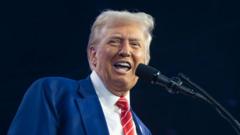As President-elect, Donald Trump has recently reignited discussions about the United States' control over strategic territories, particularly Greenland and the Panama Canal. His remarks have sparked debate over the implications of an "America First" policy that seeks to strengthen U.S. trade and national security interests.
Trump's comments, made during a recent conservative conference in Arizona, centered on his frustrations with fees charged by Panama for U.S. ships using the canal, which he described as "ridiculous, highly unfair." Historically, the U.S. ceded control of the Panama Canal to Panama through a treaty in the late 1970s. However, Trump's remarks implied a desire to reclaim oversight of the canal, citing concerns over potential Chinese influence in the region, given that China is a significant user of the canal.
Experts have interpreted Trump's threat as rooted in national security concerns. Will Freeman, an analyst with the Council on Foreign Relations, noted that ensuring the neutrality of the Panama Canal is vital for U.S. interests, especially in light of increasing tensions with China. Although Trump’s threats appeared coercive, analysts remain uncertain whether they would lead to actionable changes in canal fees or policies.
In an additional twist, Trump has reiterated his ambitions regarding Greenland, claiming that it is crucial for national security and global freedom. The autonomous Danish territory, rich in natural resources, has been of interest to various global powers, particularly as competition in the Arctic intensifies. Greenland’s Prime Minister, Múte B Egede, firmly rejected Trump's comments, stating, “We are not for sale.”
Social media exchanges have further fueled discussions surrounding his assertions. Trump's posts included imagery of American symbols being placed in the Panama Canal, while his son, Eric Trump, provoked reactions by suggesting Greenland and the Panama Canal were eligible for purchase like items in an online shopping cart.
As Trump prepares to take office again on January 20, observers are left questioning how these declarations will influence American foreign policy in both Latin America and the Arctic. Denmark's openness to future negotiations with the U.S. and a recent pledge of increased defense spending for Greenland serve as indicators of the geopolitical stakes involved in Trump's rhetoric.
Trump's comments, made during a recent conservative conference in Arizona, centered on his frustrations with fees charged by Panama for U.S. ships using the canal, which he described as "ridiculous, highly unfair." Historically, the U.S. ceded control of the Panama Canal to Panama through a treaty in the late 1970s. However, Trump's remarks implied a desire to reclaim oversight of the canal, citing concerns over potential Chinese influence in the region, given that China is a significant user of the canal.
Experts have interpreted Trump's threat as rooted in national security concerns. Will Freeman, an analyst with the Council on Foreign Relations, noted that ensuring the neutrality of the Panama Canal is vital for U.S. interests, especially in light of increasing tensions with China. Although Trump’s threats appeared coercive, analysts remain uncertain whether they would lead to actionable changes in canal fees or policies.
In an additional twist, Trump has reiterated his ambitions regarding Greenland, claiming that it is crucial for national security and global freedom. The autonomous Danish territory, rich in natural resources, has been of interest to various global powers, particularly as competition in the Arctic intensifies. Greenland’s Prime Minister, Múte B Egede, firmly rejected Trump's comments, stating, “We are not for sale.”
Social media exchanges have further fueled discussions surrounding his assertions. Trump's posts included imagery of American symbols being placed in the Panama Canal, while his son, Eric Trump, provoked reactions by suggesting Greenland and the Panama Canal were eligible for purchase like items in an online shopping cart.
As Trump prepares to take office again on January 20, observers are left questioning how these declarations will influence American foreign policy in both Latin America and the Arctic. Denmark's openness to future negotiations with the U.S. and a recent pledge of increased defense spending for Greenland serve as indicators of the geopolitical stakes involved in Trump's rhetoric.





















